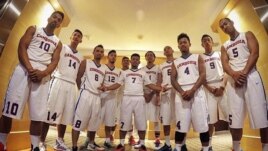30 July, 2017
Cambodia's National Basketball team is preparing to play in the Southeast Asian Games in Kuala Lumpur, Malaysia in August.
Pek Mith is the team's captain. He told VOA Khmer that the team will "play with a lot of heart."
The Southeast Asian (SEA) Games are held every two years in one of 11 Southeast Asian countries. The SEA Games permit teams to have foreign-born or foreign-raised players compete in events, just like the Olympics. But the athletes must play for a parent's native country.
Many people believe that the Cambodian basketball team would be improved by having taller, foreign players. The team hopes to win a medal in the games.
In a perfect world, the Cambodians imagine that their first medal would be a gold one. But that would mean defeating the team from the Philippines. The Philippine basketball team has won the gold medal since the SEA Games began in 1977, except for 1989 when Malaysia took first place.

The Cambodia national basketball team.
So Cambodia recruited 10 basketball players — nine from the U.S. and one from Canada. They range in height from 1.65 meters to 1.93 meters.
Rayvon Fouché is an associate professor and director of American Studies at Purdue University. He told VOA Khmer that the history of American sports showed that winning teams are driven by individual "effort and desire."
"And I think heart matters a lot," he said.
Fouché's research showed that teams with mediocre players and a higher purpose often defeat teams that only have talented players. He said, "That's why culture and community and identity within context of sports is really important."
He added, "And that's why people love the SEA Games and Olympics because playing and competing for your nation with people who have the same identity and culture — that makes you play in a way that you probably wouldn't play before."
In 2007, Sophean Toun was the first Cambodian-American player on the Cambodian National team. He says players want to compete because of national pride.
"I feel like it's our job to represent our ways in basketball to fulfill that pride that everyone should have being Cambodian," he said.
Austin Koledoye is the team's head coach.
He said that countries regularly seek the best athletes without considering their nationalities. He added that the players he recruited are not "foreigners," they are Khmer. Khmer are the majority population in Cambodia.
Koledoye said their involvement helps Cambodia, which is now getting recognition around the world.
Fouché says players coming from the U.S. have clear advantages. They are taller and better trained. He says those issues could lead to low morale in a team with native and foreign-born players.
Sok Tour is a Cambodian native who retired after the 2015 SEA Games. He now coaches for the Cambodian Basketball League Under 17 team. He says there was no resentment toward the foreign-born players.
"The Cambodian players here are limited in their skills," he said. "When we compete to represent Cambodia, we want Cambodians from the U.S. because of their expertise in the game. We want experience and we need their help."
Koledoye says that the Cambodian-Americans are role models for local Cambodians. "They leave their jobs and family to come and play," he said. "That is Khmer spirit."
I'm Jonathan Evans.
Manilene Ek reported this story for VOA News. Jonathan Evans adapted it for Learning English. Mario Ritter was the editor.
________________________________________________________________
Words in this Story
advantage – n. something (such as a good position or condition) that helps to make someone or something better or more likely to succeed than others
mediocre – adj. not very good
morale – n. the feelings of enthusiasm and loyalty that a person or group has about a task or job
recruit – v. to form or build a group, team, army, etc. by getting people to join